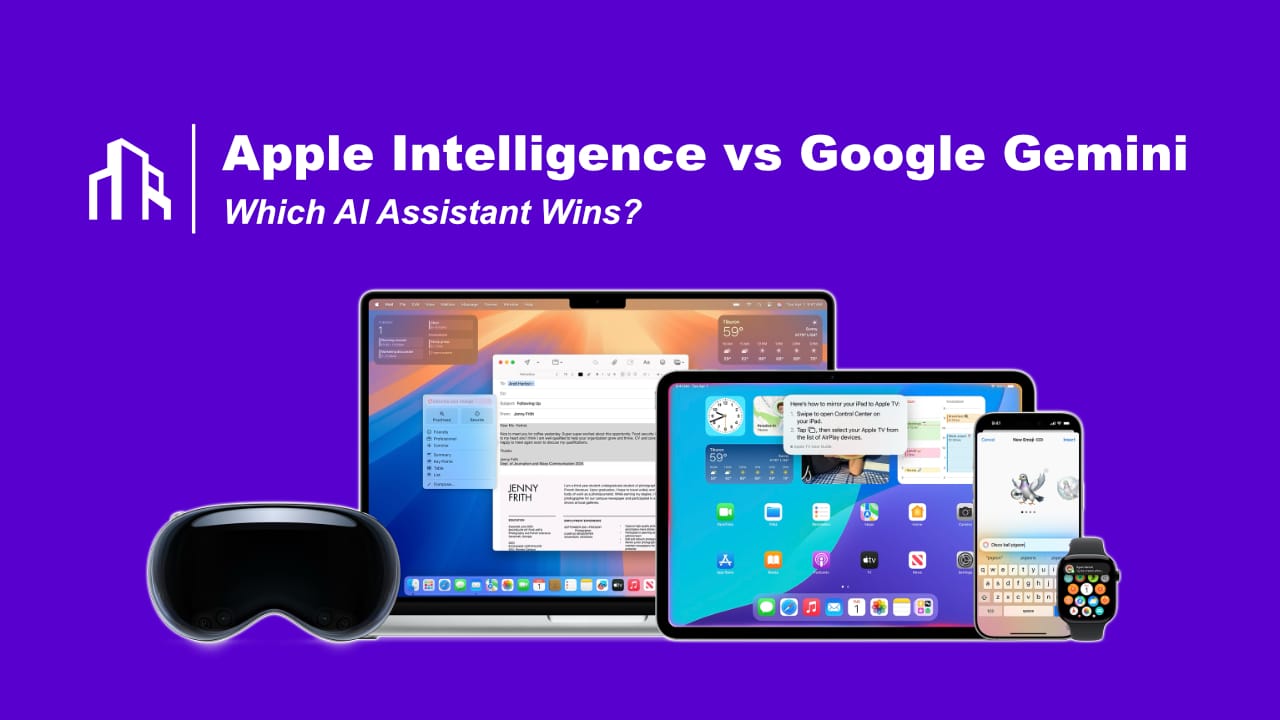Apple Intelligence vs Google Gemini: Which AI Assistant Wins?

Artificial Intelligence is no longer futuristic. It is shaping how we search, communicate, and work. With Apple introducing Apple Intelligence and Google pushing forward with Gemini, the competition between tech giants has never been more visible. But which AI assistant truly delivers more value? Let’s break it down.
What Is Apple Intelligence?
Apple Intelligence is Apple’s integrated approach to AI, announced in 2024 and positioned as a privacy-first assistant. Unlike standalone chatbots, Apple has chosen to weave intelligence into its ecosystem. That means Siri becomes smarter, your iPhone learns your context, and tasks across Mail, Notes, and Messages are automated in subtle ways.
Key strengths:
- Privacy and security: Data stays on device whenever possible, using Apple’s own chips for local processing.
- Seamless integration: It works natively inside iOS, iPadOS, and macOS without third-party setup.
- User experience: Apple focuses on invisible AI, helping users without forcing a new workflow.
Limitations:
- Available only within Apple’s ecosystem.
- Still limited in scope compared to open AI assistants.
- Early stages Apple Intelligence will grow, but today it feels less powerful than standalone models.
For organizations looking to align AI tools with compliance and security requirements, our AI consulting services can help assess where Apple Intelligence fits in your workflows.
What Is Google Gemini?
Google Gemini is the direct evolution of Google Bard, now integrated into Search, Workspace, and Android devices. Unlike Apple, Google has opted for a model-first strategy, pushing Gemini as a conversational agent across multiple contexts.
Key strengths:
- Powerful models: Gemini 1.5 and beyond offer long context windows, multimodality, and fast reasoning.
- Deep integration with Google services: Gmail, Docs, Sheets, and Search are enhanced with AI copilots.
- Cross-platform: Works on web, Android, and increasingly through APIs.
Limitations:
- Privacy concerns remain data flows through Google’s servers.
- Sometimes too experimental, with uneven performance across features.
- Less “invisible” than Apple’s approach, requiring active prompting.
Companies that depend on Google Workspace or automation should explore our workflow automation guides to see how Gemini can be embedded into everyday operations.
Head-to-Head Comparison
| Feature | Apple Intelligence | Google Gemini |
|---|---|---|
| Privacy | On-device, privacy-first | Cloud-based, mixed privacy approach |
| Integration | Deep inside iOS/macOS apps | Strong with Google Workspace + Search |
| Cross-platform | Apple devices only | Android, Web, iOS (limited) |
| Ease of use | Automatic, contextual, invisible | Prompt-driven, more manual |
| Power | Limited but consistent | Advanced models with broad scope |
| Availability | Rolling out on new Apple devices only | Broad rollout, free and paid tiers |
Related Comparison
Looking beyond Apple Intelligence, we also published a detailed breakdown of Apple AKI Answers vs Google Gemini. This article explores how Apple’s experimental AKI features compare to Gemini’s evolving AI ecosystem, offering additional insights for businesses evaluating these tools.
Which Assistant Wins?
The answer depends on what you value most.
- If privacy and seamless experience are top priorities, Apple Intelligence is the better choice. It delivers useful AI without disrupting your flow, perfect for Apple loyalists.
- If you want raw power, cross-platform flexibility, and access to cutting-edge models, Google Gemini takes the lead.
For businesses and advanced users, Gemini is currently ahead in terms of capability. For individuals inside Apple’s ecosystem, Apple Intelligence may feel more natural and less intrusive.
The Bigger Picture
This competition is less about features and more about philosophy:
- Apple focuses on AI as infrastructure — invisible, private, and device-centric.
- Google pushes AI as service — powerful, cloud-driven, and integrated with its web dominance.
Both approaches will shape how we interact with technology in the next five years. The real winner might not be one assistant over the other but the users who now have a choice.
FAQ: Availability in Europe and Beyond
When will Apple Intelligence be available in Europe?
Apple Intelligence is rolling out gradually, starting in the US. A European release is expected later, but timelines depend on privacy regulations such as GDPR.
When will Apple Intelligence launch in other countries?
Apple has confirmed expansion to Canada, the UK, and selected Asian markets first. Broader availability will follow in 2025 and beyond.
Is Google Gemini available in Europe?
Yes, Google Gemini is already accessible in many European countries via the web and Android apps. Availability may vary by language support.
Is Gemini coming to more regions soon?
Google continues to expand Gemini into more markets with localized versions. Enterprise rollouts inside Google Workspace are happening worldwide.
Which one reaches global markets faster?
Currently, Google Gemini is available in more regions. Apple Intelligence will take longer due to Apple’s stricter rollout strategy.
Conclusion
Apple Intelligence vs Google Gemini is not a fight with a single victor. It is a clash of ecosystems. Apple bets on trust and user experience, while Google bets on capability and reach.
The smart move is not asking which is better in absolute terms but instead asking: Which one fits my context best?
- Businesses relying on Google Workspace and multi-platform tools should lean toward Gemini.
- Individuals deeply embedded in the Apple ecosystem should embrace Apple Intelligence.
At Scalevise, we help organizations choose and implement the right AI workflows. Whether you’re considering Gemini integrations or Apple Intelligence adoption, our AI resources hub is a good starting point. For direct guidance, contact us today.
